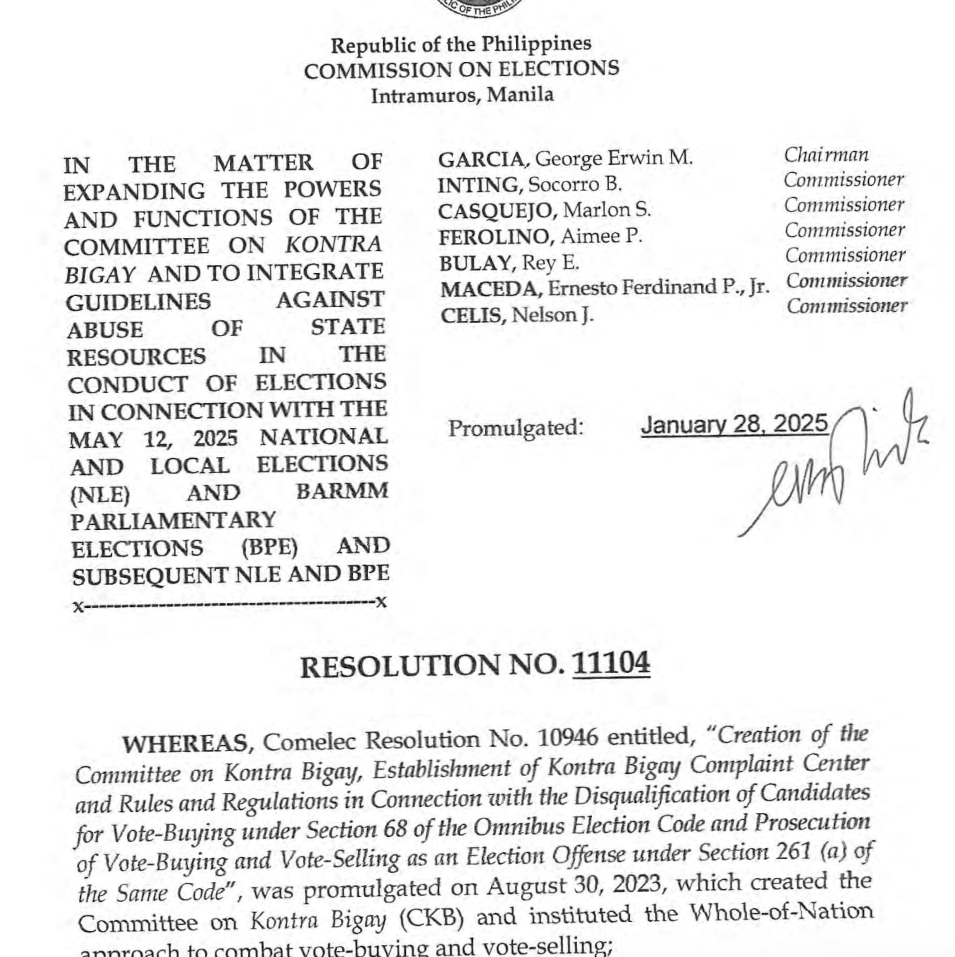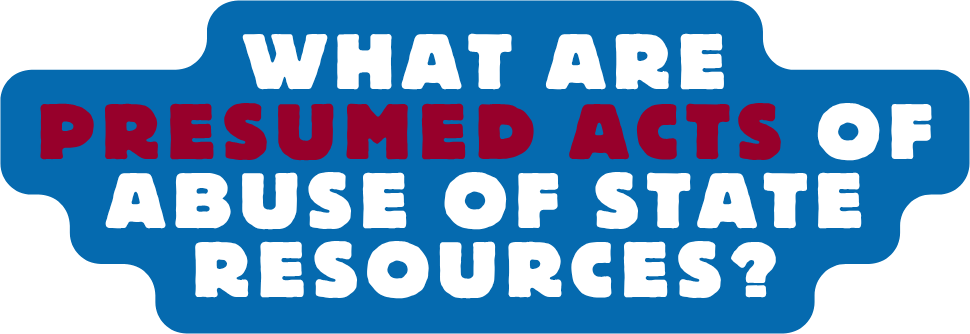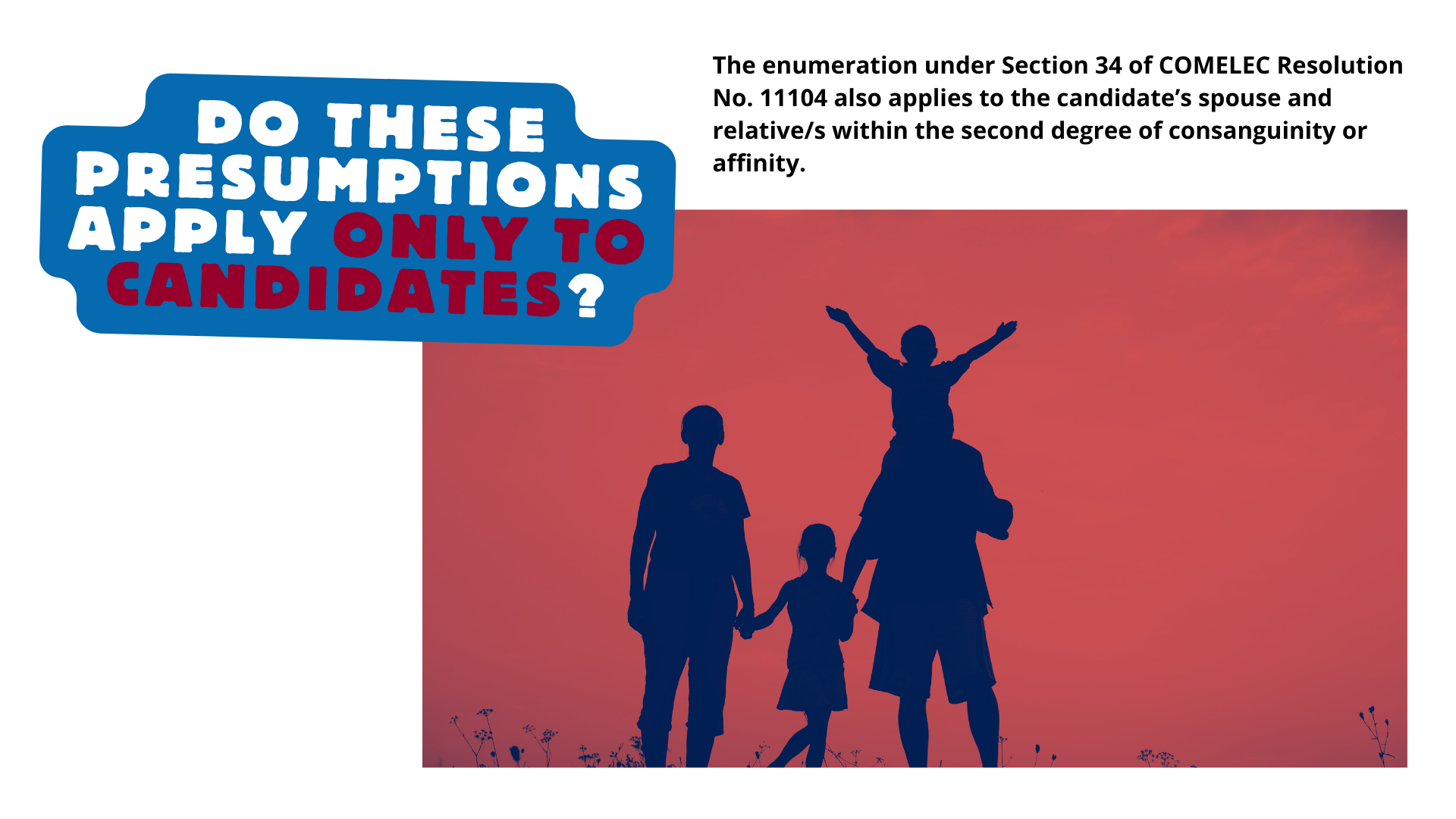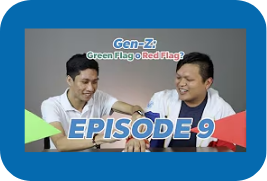

Section 30 of COMELEC Resolution No. 11104 defines abuse of state resources (ASR) as the misuse of government resources – whether material, human, coercive, regulatory, budgetary, media-related, or legislative – for electoral advantage. Under the same resolution, ASR may be committed through the following acts:a. Intervention of public officers and employees in any election campaign, or their engagement in any partisan political activity;b. Undue influence such as by promising an office, employment, or expenditure to a person or entity so as to induce a vote for or against any candidate;c. Use of public funds, money deposited in trust, equipment, facilities owned or controlled by the government for an election campaign. d. Release, disbursement, or expenditure of public funds for public works forty-five days before a regular election and thirty-days before a special election;e. Construction of public works, delivery of materials for public works and issuance of treasury warrants and similar devices forty-five days before a regular election.
Under COMELEC Resolution 11104, Section 28, during the period of two (2) days before an election and on election day, it shall be prohibited to possess, transport and/ or carry cash exceeding Five Hundred Thousand Pesos (P500,000.00) or its equivalent in any foreign currency, along with campaign paraphernalia and/ or corroborating evidence.
For this purpose, all COMELEC checkpoints all over the Philippines are directed to conduct a 24-hour money ban checkpoint, in addition to the gun ban checkpoint for the duration of the period stated.


Under Section 34 of COMELEC Resolution No. 11104, the following and other analogous conduct are considered presumed acts of ASR:
a. Storage or transport of campaign materials on government vehicles;
b. Storage of campaign paraphernalia and of food and beverages intended for the supporters of a candidate in any government facility or property, such as barangay halls and covered courts;
c. Display of campaign materials in any government facility or property (e.g. covered courts, barangay halls, patrol cars, ambulance), unless such areas are designated as common poster areas;
d. Distribution or delivery of assistance and legitimate social welfare benefits and programs of the government (e.g. TUPAD, AKAP, AICS and 4Ps) with displayed campaign materials, or when made in the presence and participation of the candidate, his/her spouse or relative within the second civil degree of affinity or consanguinity;
e. Use of media platforms or official pages of the government to feature the face, image, appearance, logo, or signature of any public official;
f. Use of government-funded programs as a platform to display the signage, name, visage, appearance, logo, or signature to promote the candidacy of any appointed or elected public official;
g. Sudden and unjustified revocation or undue refusal to include qualified beneficiaries in scholarship programs and other government grants;
h. Sudden influx of hiring of Job Order and Contract of Services workers and their subsequent engagement in partisan political activities by campaigning for or against a candidate during official hours of work.

.png)
The enumeration under Section 34 of COMELEC Resolution No. 11104 also applies to the candidate’s spouse and relative/s within the second degree of consanguinity or affinity. As a form of corruption, abuse of state resources penetrates into the core of governance and public service. Hence, its implications and manifest consequences exist in all seasons – i.e. before, during, and after election period
Abuse of state resources impairs governance and may result in the following situations:
- Creation of an electoral system that is vulnerable to manipulation by those in positions of power
- Undermining of competitiveness, and reduction of public trust in election outcomes.
- Derailment of much-needed development, infrastructure, or social welfare projects and the harmful consolidation of the rule of law
- Incentivization of political dynasties and inducement of political venture capitalism.


The enumeration under Section 30 and 31 of COMELEC Resolution No. 11104 covers the exempted release, disbursement, or expenditure of public funds:
i. Maintenance of existing and/or completed public works project: Provided, That not more than the average number of laborers or employees already employed therein during the six-month period immediately prior to the beginning of the forty-five (45) day period before election day shall be permitted to work during such time: Provided, further, That no additional laborers shall be employed for maintenance work within the said period of forty-five (45) days;
ii. Work undertaken by contract through public bidding held, or by negotiated contract awarded, before the forty-five (45) day period before election: Provided, That work for the purpose of this section undertaken under the so-called “takay” or “paquiao” system shall not be considered as work by contract;
iii. Payment for the usual cost of preparation for working drawings, specifications, bills of materials, estimates, and other procedures preparatory to actual construction including the purchase of materials and equipment, and all incidental expenses for wages of watchmen and other laborers employed for such work in the central office and field storehouses before the beginning of such period: Provided, That the number of such laborers shall not be increased over the number hired when the project or projects were commenced; and
iv. Emergency work necessitated by the occurrence of a public calamity, but such work shall be limited to the restoration of the damaged facility.
No payment shall be made within five (5) days before the date of election to laborers who have rendered services in projects or works except those falling under subparagraphs (i), (ii), (iii), and (iv), of this paragraph.
This prohibition shall not apply to ongoing public works projects commenced before the campaign period or similar projects under foreign agreements. For purposes of this provision, it shall be the duty of the government officials or agencies concerned to report to the Commission the list of all such projects being undertaken by them
iv. Emergency work necessitated by the occurrence of a public calamity, but such work shall be limited to the restoration of the damaged facility. No payment shall be made within five (5) days before the date of election to laborers who have rendered services in projects or works except those falling under subparagraphs (i), (ii), (iii), and (iv), of this paragraph.
This prohibition shall not apply to ongoing public works projects commenced before the campaign period or similar projects under foreign agreements. For purposes of this provision, it shall be the duty of the government officials or agencies concerned to report to the Commission the list of all such projects being undertaken by them.
Moreover, under Section 28, the provision on money ban shall not apply to persons, who by the nature of their duty, profession, business or occupation as cashiers or disbursing officers, transport or carry cash exceeding P500,000.00 or its equivalent in any foreign currency. Provided that, when transporting or carrying such amount, they must be in the actual performance of their duties involving the transport of money or disbursement of payrolls, and in possession of the following:
- Certificate of employment stating that he / she is currently employed as cashier or disbursing officer; and
- Company or office-issued identification card showing his / her photograph, designation and signature.


In the past elections, LENTE obtained reports of ASR incidents. During the 2025 National and Local Elections, more than 16% of election offenses reported to LENTE consisted of ASR. Majority of such cases involved local candidates.
Among the presumed acts, the most recorded was the distribution or delivery of assistance/social welfare benefits with campaign materials (or in the presence of candidate/family). The second most recorded was the use of government-funded programs/activities as a platform to display campaign signage or promote candidacy.
For any incidents of abuse of state resources in elections in your area, report the same using this LINK or you may call LENTE Hotline at 0920-266-0944.

Episode 1

Episode 2

Episode 3

Episode 4

Episode 5

Episode 6

Episode 7

Episode 8

Episode 9

Episode 10




.png)



.png)
.png)
.png)



